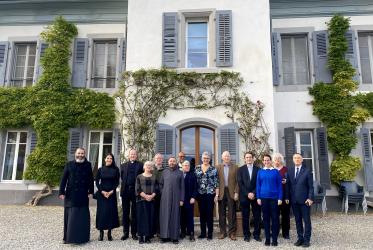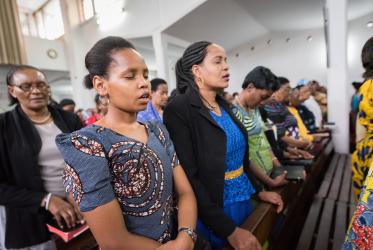World Council of Churches
CENTRAL COMMITTEE
Geneva, Switzerland
26 August - 3 September 2002
Padare offerings
There will be several Padare offerings at Central Committee taking place on Tuesday, 27 August and Wednesday, 28 August from 14.30-16.00h. Committee members will have a chance to attend at least two of these.
TUESDAY 27
1. Consensus Decision-Making
The Special Commission articulated the concerns of the Orthodox Churches regarding their participation in the ecumenical movement, by identifying difficult and unclear issues related to the WCC as an institution and its style of decision-making.
The members of the Special Commission agreed that this might be addressed through changes in the procedures of decision-making by the governing bodies.
The Special Commission is proposing consensus decision-making as an alternative. This concept is not new for the WCC as some members have experienced this in their churches ("conciliarity" in the case of Orthodox churches, and "suspending judgement" as the historic peace churches).
The purpose of the Padare is to:
· Introduce consensus decision-making to the Central Committee members.
· Uplift the theology and experiences of member churches of the WCC around this issue.
· Provide the opportunity to clarify the concept and its application through dialogue among the members of the Central Committee.
· Highlight the implications of this new way of deciding on the Common Understanding and Vision (CUV) policy statement.
2. Forum of Christian Churches and Ecumenical Organisations
The governing bodies of the WCC were regularly kept informed about the Forum proposal, since the first consultation in August 1998 and the subsequent recommendation of the Harare Assembly. The third consultation took place in June 2002, at the Fuller Theological Seminary in Pasadena, USA. The purpose of this consultation which included representatives of all the main Christian traditions, was:
· To expand and deepen the exploration of the Forum proposal with Evangelical, Pentecostal and African instituted churches and organisations;
· To involve a more widely representative group of the various Christian traditions participating in the exploration of the Forum proposal;
· To decide whether a first Forum event should be convened and to provide guidance regarding its implementation.
The aim of this Padare will be to share feedback from the consultation with interested members of the Central Committee, and to discuss the implications of the results of the meeting for the future of the Forum process.
3. New Partnership for Africa's Development (NEPAD)
For four decades, Africa has been subjected to several development plans and declarations of intent. Despite all these plans, equitable and sustainable development which focuses on gender mainstreaming and eradication of poverty has not been achieved. African Leaders have now come up with another plan called "The New Partnership for Africa’s Development" (NEPAD). While this plan has gained high international praise, the people of Africa including labour unions, farmers, community based organisations, and NGOs were excluded during its formation. This new plan has put promotion of democracy and good governance as the first priority, yet the formation of the plan began without the full involvement of the people. This deficit is now the challenge of African heads of states who formulated this initiative. The churches in Africa and the wide ecumenical network are called to enrich this African initiative by introducing the concept of, and providing mechanisms for subsidarity.
The Padare aims to
· Inform the Central Committee members about the process that has led to the establishment of NEPAD,
· Learn at what level the African churches have been engaged in NEPAD and what their expectations are,
· Identify the role of the churches in this process.
The Padare would hopefully lead to some possible ecumenical responses to NEPAD and show the ecumenical movement how it can accompany the churches of Africa in playing their role in this process.
4. Challenges to the Churches in the Aftermath of 11 September
It has been almost a year since the attacks on New York and Washington and the subsequent US declaration of a “war on terrorism.” These events have had a significant impact on international and national politics and on the churches, primarily by accelerating global trends, including the erosion of international law, the weakening of international institutions, and the militarization of conflicts. Existing asymmetries in power have been brought into sharp relief. The events have had a major impact in some regions, notably the Middle East and Asia, while other regions have found it difficult to attract international attention to other burning issues.
Purpose of the Padare: to engage members of Central Committee in reflecting on the implications of the response to the 11 September attacks and the role of churches in the present global context. As the Central Committee will consider a Public Issues statement on “Beyond 11 September” (title to be determined), this Padare will provide both a background for the statement, and a forum for reflection on the issues.
5. Issues Concerning People with Disabilities –
Developing a New Interim Statement on the Theological Understanding
The aim of the Padare is to start a conversation with members of the Central Committee that can feed into the process of developing a new interim statement on the theological understanding of the issues concerning people with disabilities.
The discussion at the Padare will focus on four areas:
Disability and anthropology: People with disabilities - who are they? How do the experiences of life with disabilities effect our understanding of what it is to be human and created as imago dei?
How do we understand disability in relation to human rights?
Disability and theology: How do the questions concerning people with disabilities change our theology, our understanding and our ways of talking about God and our faith? Does this concern have any implications for our christology? How do we understand scripture passages about healing?
Disability and ecclesiology: In what ways do we have to change our ecclesiology so that the church can be truly accessible and inclusive towards people with disabilities? How does that change our understanding of the church as the body of Christ?
Disability and the life of the churches: What implications does this have for the life of the churches at different levels? How do the churches receive the gifts God wants to give through people with disabilities? How do we stop and prevent discrimination against people with disabilities? How do our liturgies have to change in order to be inclusive towards people with disabilities?
WEDNESDAY 28
6. Membership Issues
The aim is to help members of the Central Committee to be informed about the process and objectives of the reflection on membership issues conducted in the Special Commission and by the Membership Study Group, and to understand the substance and the recommendations on membership contained in the reports that will be presented to the Central Committee.
The Padare will begin with a brief introduction followed by testimonies by Central Committee members on:
1) The experience of grouped membership (e.g. the United Lutheran Churches in India, the Evangelical Church in Germany);
2) The experience of groupings of churches for the purpose of representation and participation (e.g. the Nordic region) and the potential problems of such groupings (e.g. the Caribbean or the Pacific).
In addition, two or three members of Central Committee will be asked beforehand to formulate a question on a specific part of the report of the Membership Study Group, e.g. on modes of relating to the WCC, on the theological criteria, on the role of a Central Committee member.
7. A contemporary Issue for Theological Anthropology and Ecclesiology: Human Sexuality
At the Harare Assembly, the Programme Guidelines Report emphasised the need for the WCC to address issues of personal and interpersonal ethics, and noted:
The WCC should offer space and direction for conversation and consultation enabling member churches to discuss these difficult issues - including human sexuality - which cause division within and among its member churches.
A Reference Group and Staff Group have been engaged in exploring questions of human sexuality so that they can offer advice to the General Secretary on those issues. Yet there has not been an occasion when it has been possible to provide a space for representatives of the churches to have a conversation and dialogue on how they are addressing those questions which are dividing their churches.
The Padare will provide such a space and will focus on:
1) What does it mean to be church when we so obviously represent the brokenness of the church?
2) How do we say mutually that we intend to stay together when our differently held, authentic self-understandings of the faith offend each other so deeply?
3) How do we insure depth of theological and pastoral discussion while engaging/ addressing the urgency of the situation that we face?
4) How do we facilitate discussion on issues of human sexuality?
8. The 'Ecumenical Campaign to End the Illegal Occupation of Palestine: Support a Just Peace in the Middle East' - 2002 Focus of the Decade to Overcome Violence
The 'Minute on the Situation in the Holy Land after the Outbreak of the Second Palestinian Uprising' adopted by the Central Committee in Potsdam in February 2001 marked the beginning of a process which has led to the Ecumenical Campaign Against the Illegal Occupation of Palestine: Support a Just Peace in the Middle East, and the Ecumenical Accompaniment Programme in Palestine and Israel (EAPPI).
The purpose of this Padare is to provide the opportunity for Central Committee members:
· To learn more about the current situation in Israel/Palestine.
· To hear about the development of the ecumenical actions that have been initiated based on their decision in Potsdam.
· To share feedback with one another on how their own churches have been active on the issue.
9. Inter-Religious Dialogue
In the recent months, two documents on inter-religious dialogue were produced through a consultative process initiated by the team on Inter-religious Relations and Dialogue. The first offers some reflections on the proliferating international multi-religious initiatives, to some of which the participation of the WCC is solicited. The second proposes new guidelines for dialogue. To some extent, it is a revision of the widely used WCC document entitled “Guidelines for Dialogue with People of Living Faiths”, received by the Central Committee in 1979. In addition it draws on what has been achieved or attempted in the last two decades.
It is suggested that short presentations of the two above-described documents open a general discussion. Participants will be invited to share their thoughts on inter-religious dialogue today, at the global level and from the perspective of their local experience. They will also be asked to give advice on the urgent and relevant tasks that may best respond to the growing demand for encounters, of various sorts, between Christians and people of other religions.
10. WCC and Eastern Europe: New Horizons
The Padare will explore some of the tremendous changes and challenges that have affected this region in the decade following the end of the USSR. Attention will be given to important developments and new tensions in church and ecumenical life in the region, especially in relationship to the Special Commission on Orthodox participation in the WCC. The involvement and perspectives of WCC in the region, including the role of the WCC Eastern Europe Office in Poland, will be analysed and discussed.
In reference to the region of Central and Eastern Europe, the Padare will seek to:
· Review the general and ecumenical context and recent developments.
· Discuss major issues and challenges churches and partners are facing in the region.
· Review some of the programmatic efforts of WCC over the past decade.
· Identify priorities and strategies for WCC in the coming period.
11. Schools for Evangelism
The purpose of this Padare is to share with the Central Committee members the relevant information of our two most recent "Schools for Evangelism". The first one was held in Havana, Cuba, Dec 6-15, 2001 in co-ordination with the Caribbean Conference of Churches and the second one took place in Aleppo, Syria, June 2-7, 2002, together with the Middle East Council of Churches.
The aim of these events was to engage in a study and discussion of the biblical and theological understandings of the evangelism aspect of mission and to articulate and live out an authentic response to God's loving intentions in the particular region where we meet. They were carried out in order to support the local churches in their efforts to share joyfully the good news of the Gospel, which includes an invitation, an explicit and intentional voicing of the Gospel, a call for people to repent, and come to a personal faith or conversion and new life in Jesus Christ as Saviour and Lord as well as to discipleship, witness and obedient service in the world.
Tuesday, 27 August, at 14.30
1. Consensus Decision-Making *
2. Forum of Christian Churches and Ecumenical
Organisations
3. NEPAD
4. Challenges to the Churches in the Aftermath
of 11 September *
5. Issues Concerning People with Disabilities
Wednesday, 28 August, at 14.30
6. Membership Issues *
7. A contemporary Issue for Theological
Anthropology and Ecclesiology: Human Sexuality
8. Ecumenical Campaign to End the Illegal
Occupation of Palestine
9. Inter-Religious Dialogue *
10. WCC and Eastern Europe: New Horizons
11. Schools for Evangelism
* With interpretation in English, French, German and Spanish



